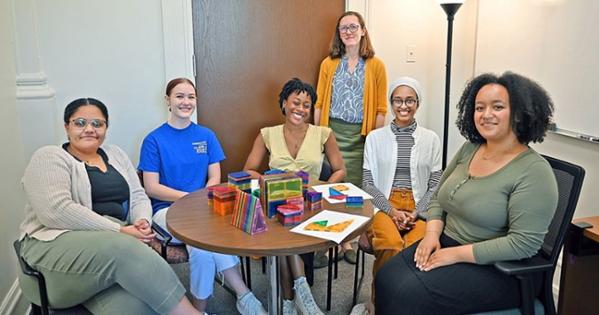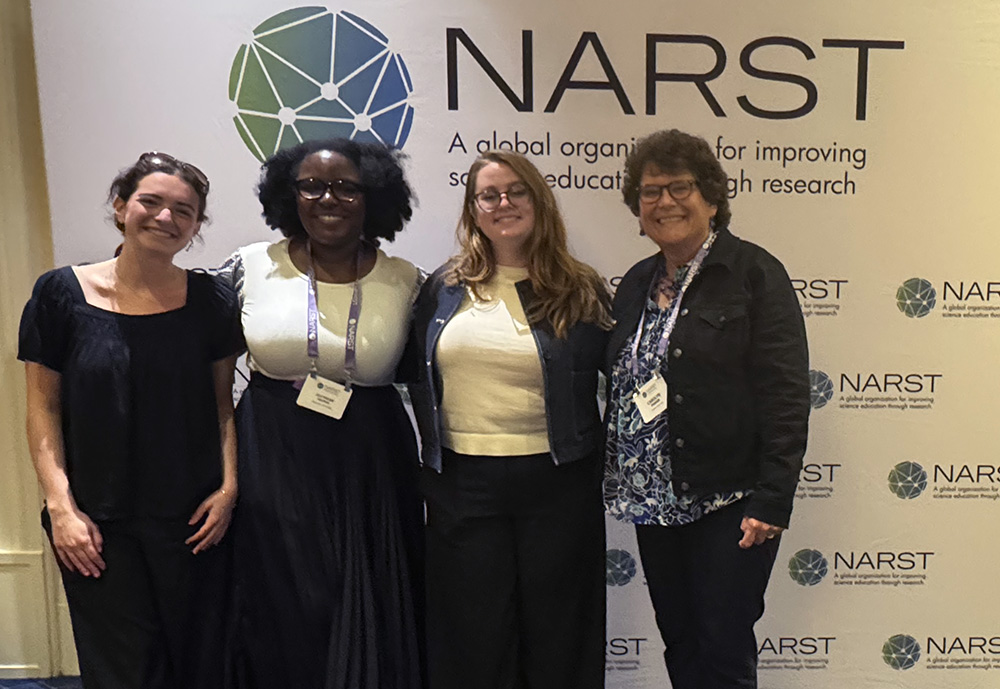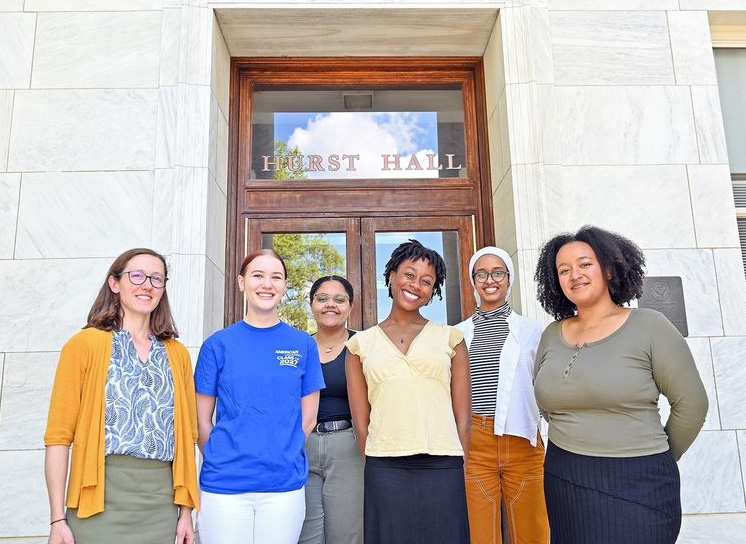Undergraduate Research Flourishes at the School of Education

When American University achieved the prestigious Research 1 status in February, joining the elite ranks of just 187 top doctoral research institutions as classified by the Carnegie Commission on Higher Education, it marked a significant milestone in the university's academic journey. But behind this achievement lies a distinctive approach to research that sets AU apart: the remarkable involvement of undergraduate students in meaningful research experiences.
A Rare Opportunity in Higher Education
While doctoral and master's students routinely participate in research at universities across the country, American University's School of Education (SOE) stands out for its commitment to involving undergraduates in substantial research projects. This approach not only enhances the university's research capacity but transforms the educational experience of students years before they might otherwise engage with research.
"I don't believe I would have had the opportunity to be involved in research as an undergraduate student if I did not attend AU," explains Sophia Stull, an elementary education major minoring in special education and psychology.
The small, community-oriented feel of AU, and specifically our School of Education, gave me the courage to reach out to Dr. Peterson and express my interest in educational research as a first-year student.
Non-education minors also benefit from the opportunities SOE's research grants offer. Krissy Kanu '25, a psychology major who is minoring in legal studies and communications. "I have always had an interest in student motivations, which resonates particularly well with our science curiosity research at the EdNeuroscience lab," she said.
This accessibility to faculty researchers represents a fundamental strength of the SOE model. While many research institutions create hierarchies that keep undergraduates far from the cutting edge of discovery, AU has cultivated an environment where even first-year students can become valued contributors to significant research projects.
From Classroom to Research Lab: Transformative Journeys
 For students like Nikki LeVee, a double major in secondary education and sociology graduating this May, the research experience has become central to her academic identity. Since her sophomore year, LeVee has assisted Dr. Carolyn Parker on a problem-based learning grant from the National Science Foundation, participating in every phase from professional development and curriculum development to data collection and conference presentations.
For students like Nikki LeVee, a double major in secondary education and sociology graduating this May, the research experience has become central to her academic identity. Since her sophomore year, LeVee has assisted Dr. Carolyn Parker on a problem-based learning grant from the National Science Foundation, participating in every phase from professional development and curriculum development to data collection and conference presentations.
Being a research assistant for Dr. Parker on this problem-based learning grant is the perfect intersection of my two fields of study of secondary education and sociology. This opportunity has not only honed my research skills but also influenced my philosophy of education as I student teach.
The impact extends beyond skill development. LeVee explains, "Not only is this work important to my degree, but also to my future career in teaching students using a problem-based approach about the world surrounding them."
This integration of research experience with classroom practice exemplifies AU's commitment to connecting theory with application. Students don't simply learn about educational research—they actively contribute to it while developing their teaching philosophy.
Faculty Commitment to Undergraduate Researchers
The success of undergraduate research initiatives at SOE depends largely on faculty members who embrace mentorship roles with emerging scholars. Dr. Emily Grossnickle Peterson's lab represents this commitment in action.
 "I think I've mentored a total of 19 undergrad research assistants since 2017," Dr. Peterson notes. "Undergraduates in my lab do all different sorts of things from running data collection sessions to helping to do all the behind-the-scenes work that leads up to actually running studies."
"I think I've mentored a total of 19 undergrad research assistants since 2017," Dr. Peterson notes. "Undergraduates in my lab do all different sorts of things from running data collection sessions to helping to do all the behind-the-scenes work that leads up to actually running studies."
This hands-on involvement creates opportunities for undergraduates to build academic credentials typically reserved for graduate students. "My current two students have presented their work at AU's Robyn Rafferty Mathias Student Research Conference and are co-authors on some national and international conference presentations," Dr. Peterson adds.
The mentorship model extends beyond technical training to include professional development and exposure to the broader academic community. LeVee reflects on this aspect: "We are heading to the National Association for Research in Science Teaching annual conference this week... Because of the tight-knit SOE community, I gained several years of research experience in pedagogy and simultaneously gained the most humble and intelligent mentor during almost all of my time at AU."
Discovering New Passions Through Research
Perhaps most remarkably, undergraduate research experiences at SOE often help students discover interests and abilities they hadn't previously recognized in themselves. For Stull, working in Dr. Peterson's lab challenged her self-perception and opened new academic horizons.
"My work in the lab was one of my first exposures to psychology research, and it really broadened my understanding of what science is," Stull explains. "I deemed myself a 'non-science person' and didn't allow myself to reconsider this opinion until I began working on educational neuroscience research. My work in the lab is what led me to discover my interest in psychology and passion for research as a whole, and I could not be more grateful for that."
This transformation from this self-described "non-science person" to passionate researcher illustrates how undergraduate research opportunities can reshape academic identities and career trajectories. By involving students early in authentic research experiences, SOE creates pathways for discovery that extend far beyond conventional classroom learning.
The R1 Advantage: Enhancing AU's Research Ecosystem
American University's achievement of R1 status strengthens its capacity to support these formative research experiences while creating a positive feedback loop of opportunity. The classification enhances AU's ability to attract and retain distinguished faculty researchers, expand funding opportunities, and build more robust research programs—all of which create additional opportunities for undergraduate involvement.
The R1 designation also validates AU's distinctive approach of integrating research excellence with a teaching focus. Rather than seeing these as competing priorities, the School of Education demonstrates how they can reinforce each other, with undergraduate research participation serving as a critical bridge.
"I am incredibly interested in student learning and developing the existing body of research and knowledge surrounding learning," says Stull. "As a current student, I am also very interested to find ways that I can broaden my own knowledge and learn about things related to my passions. I feel that my work in Dr. Peterson's lab compliments both my future role as an educator and my current role as a student perfectly."
A Legacy of Mentorship and Growth
As students like LeVee prepare to graduate, they carry forward not just research skills but transformative relationships and experiences that shape their professional identities.
"Reflecting back, this has been one of the most rewarding and pivotal experiences in my time at AU, including opportunities outside of our campus and gaining a consistent mentor who I have looked up to for all of these consecutive years," LeVee says.
Mohamed Moustafa, who earned degrees in 2023 in secondary education and environmantal studies, now teaches at Montgomery County Public Schools' Parkland Magnet Middle School for Aerospace Technology. Research experiences under Dr. Parker directly helped his career, which he hopes will eventually lead him to teach AP high school envinonmental science:
I learned the importance of data collection and data-based decision-making when creating science lessons. I was exposed to the Next Generation Science Standards early on, which helped me in the interview process, during professional development, and when making lesson plans for students.
Kanu enjoys the relationships she built as part of her research:
I feel grateful for the opportunity to work so closely with other members of the lab and individuals across campus. The ability to establish meaningful relationships while working together toward common goals increases efficiency while sustaining a fruitful and enjoyable work environment.
Her advice for new students is to, "start early and apply for all opportunities available! Allowing yourself to practice working in various areas helps to polish an understanding of personal interests and identify interacting concepts."
This sentiment captures what makes SOE's approach to undergraduate research so valuable—it combines rigorous academic training with meaningful mentorship in a community where students are truly seen and supported. As American University celebrates its R1 status, the School of Education stands as a model for how research excellence can enhance the undergraduate experience while preparing the next generation of education leaders and scholars.
The result is a distinctive research ecosystem where everyone benefits: faculty access eager and capable research assistants, undergraduates gain invaluable experience and mentorship, and the field of education receives fresh perspectives from diverse voices much earlier in their academic journey.